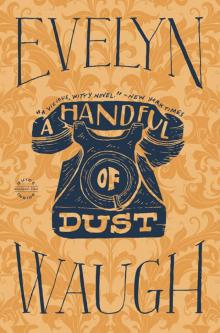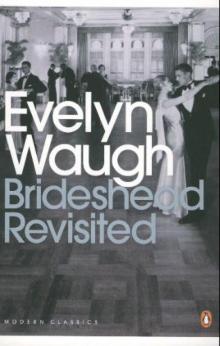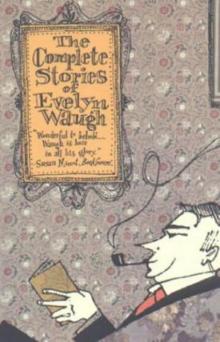- Home
- Evelyn Waugh
Put Out More Flags Page 2
Put Out More Flags Read online
Page 2
The windows were open now on the balcony. Lady Seal sat in an elegant rosewood chair gazing out across the square. She had just heard the Prime Minister’s speech. Her butler approached from the end of the room.
“Shall I remove the radio, my lady?”
“Yes, by all means. He spoke very well, very well indeed.”
“It’s all very sad, my lady.”
“Very sad for the Germans, Anderson.”
It was quite true, thought Lady Seal; Neville Chamberlain had spoken surprisingly well. She had never liked him very much, neither him nor his brother—if anything she had preferred the brother—but they were uncomfortable, drab fellows both of them. However, he had spoken very creditably that morning, as though at last he were fully alive to his responsibilities. She would ask him to luncheon. But perhaps he would be busy; the most improbable people were busy in war time, she remembered.
Her mind went back to the other war, that until that morning had been The War. No one very near to her had fought. Christopher had been too old, Tony just too young; her brother Edward had begun by commanding a brigade—they thought the world of him at the Staff College—but, inexplicably, his career had come to very little; he was still brigadier in 1918, at Dar-es-Salaam. But the war had been a sad time; so many friends in mourning and Christopher fretful about the coalition. It had been a bitter thing for them all, accepting Lloyd George, but Christopher had patriotically made the sacrifice with the rest of them; probably only she knew how much he had felt it. The worst time had been after the armistice, when peerages were sold like groceries and the peace terms were bungled. Christopher had always said they would have to pay for it in the long run.
The hideous, then unfamiliar shriek of the air-raid sirens sang out over London.
“That was the warning, my lady.”
“Yes, Anderson, I heard it.”
“Will you be coming downstairs?”
“No, not yet at any rate. Get all the servants down and see they are quiet.”
“Will you require your respirator, my lady?”
“I don’t suppose so. From what Sir Joseph tells me the danger of gas is very slight. In any case I daresay this is only a practice. Leave it on the table.”
“Will that be all, my lady?”
“That’s all. See that the maids don’t get nervous.”
Lady Seal stepped on to the balcony and looked up into the clear sky. They’ll get more than they bargain for if they try and attack us, she thought. High time that man was taught a lesson. He’s made nothing but trouble for years. She returned to her chair thinking, Anyway I never made a fuss of that vulgar man von Ribbentrop. I wouldn’t have him inside the house, even when that goose Emma Granchester was plaguing us all to be friendly to him. I hope she feels foolish this morning.
Lady Seal waited with composure for the bombardment to begin. She had told Anderson it was probably only a practice. That was what one told servants; otherwise they might panic—not Anderson but the maids. But in her heart Lady Seal was sure that the attack was coming; it would be just like the Germans, always blustering and showing off and pretending to be efficient. The history Lady Seal had learned in the schoolroom had been a simple tale of the maintenance of right against the superior forces of evil and the battle honors of her country rang musically in her ears—Crecy, Agincourt, Cadiz, Blenheim, Gibraltar, Inkerman, Ypres. England had fought many and various enemies with many and various allies, often on quite recondite pretexts, but always justly, chivalrously, and with ultimate success. Often, in Paris, Lady Seal had been proud that her people had never fallen to the habit of naming streets after their feats of arms; that was suitable enough for the short-lived and purely professional triumphs of the French, but to put those great manifestations of divine rectitude which were the victories of England to the use, for their postal addresses, of milliners and chiropodists, would have been a baseness to which even the radicals had not stooped. The steel engravings of her schoolroom lived before her eyes, like tableaux at a charity fête—Sydney at Zutphen, Wolfe at Quebec, Nelson at Trafalgar (Wellington, only, at Waterloo was excluded from the pageant by reason of the proximity of Blücher, pushing himself forward with typical Prussian effrontery to share the glory which the other had won) and to this tremendous assembly (not unlike in Lady Seal’s mind those massed groups of wealth and respectability portrayed on the Squadron Lawn at Cowes and hung with their key plans in lobbies and billiard rooms) was added that morning a single new and rather improbable figure, Basil Seal.
The last war had cost her little; nothing, indeed, except a considerable holding of foreign investments and her brother Edward’s reputation as a strategist. Now she had a son to offer her country. Tony had weak eyes and a career, Freddy was no blood of hers and was not cast in a heroic mould, but Basil, her wayward and graceless and grossly disappointing Basil, whose unaccountable taste for low company had led him into so many vexatious scrapes in the last ten years, whose wild oats refused to correspond with those of his Uncle Edward; Basil who had stolen her emeralds and made Mrs. Lyne distressingly conspicuous; Basil, his peculiarities merged in the manhood of England, at last was entering on his inheritance. She must ask Jo about getting him a commission in a decent regiment.
At last, while she was still musing, the sirens sounded the All Clear.
Sir Joseph Mainwaring was lunching with Lady Seal that day. It was an arrangement made early in the preceding week before either of them knew that the day they were choosing was one which would be marked in the world’s calendars until the end of history. He arrived punctually, as he always did; as he had done, times out of number, in the long years of their friendship.
Sir Joseph was not a church-going man except when he was staying at one of the very rare, very august houses where it was still the practice; on this Sunday morning, however, it would not have been fantastic to describe his spirit as inflamed by something nearly akin to religious awe. It would be fantastic to describe him as purged, and yet there had been something delicately purgative in the experiences of the morning and there was an unfamiliar buoyancy in his bearing as though he had been at somebody’s Eno’s. He felt ten years younger.
Lady Seal devoted to this old booby a deep, personal fondness which was rare among his numerous friends and a reliance which was incomprehensible but quite common.
“There’s only ourselves, Jo,” she said as she greeted him. “The Granchesters were coming but he had to go and see the King.”
“Nothing could have been more delightful. Yes, I think we shall all be busy again now. I don’t know exactly what I shall be doing yet. I shall know better after I’ve been to Downing Street to-morrow morning. I imagine it will be some advisory capacity to the War Cabinet. It’s nice to feel in the centre of things again, takes one back ten years. Stirring times, Cynthia, stirring times.”
“It’s one of the things I wanted to see Emma Granchester about. There must be so many committees we ought to start. Last war it was Belgian refugees. I suppose it will be Poles this time. It’s a great pity it isn’t people who talk a language one knows.”
“No, no Belgians this time. It will be a different war in many ways. An economic war of attrition, that is how I see it. Of course we had to have all this A.R.P. and shelters and so on. The radicals were making copy out of it. But I think we can take it there won’t be any air raids, not on London at any rate. Perhaps there may be an attempt on the seaports, but I was having a most interesting talk yesterday to Eddie Beste-Bingham at the Beefsteak; we’ve got a most valuable invention called R.D.F. That’ll keep ’em off.”
“Dear Jo, you always know the most encouraging things. What is R.D.F.?”
“I’m not absolutely clear about that. It’s very secret.”
“Poor Barbara has evacuees at Malfrey.”
“What a shocking business! Dear, dreaming Malfrey. Think of a Birmingham board school in that exquisite Grinling Gibbons saloon. It’s all a lot of nonsense, Cynthia. You know I’m the last ma
n to prophesy rashly, but I think we can take one thing as axiomatic. There will be no air attack on London. The Germans will never attempt the Maginot line. The French will hold on forever, if needs be, and the German air-bases are too far away for them to be able to attack us. If they do, we’ll R.D.F. them out of the skies.”
“Jo,” said Lady Seal, when they were alone with the coffee. “I want to talk to you about Basil.”
How often in the last twenty years had Sir Joseph heard those heavy words, uttered with so many intonations in so wide a variety of moods, but always, without fail, the prelude, not, perhaps to boredom, but to a lowering of the interest and warmth of their converse! It was only in these maternal conferences that Cynthia Seal became less than the perfect companion, only then that, instead of giving, she demanded, as it were, a small sumptuary duty upon the riches of her friendship.
Had he been so minded Sir Joseph could have drawn a graph of the frequency and intensity of these discussions. There had been the steady rise from nursery, through school to the university, when he had been called on to applaud each new phase of Basil’s precocious development. In those days he had accepted Basil at his face value as an exceptionally brilliant and beautiful youth in danger of being spoiled. Then, towards the end of Basil’s second year at Balliol had come a series of small seismic disturbances, when Cynthia Seal was alternately mutely puzzled or eloquently distressed; then the first disaster, rapidly followed by Christopher’s death. From then onwards for fifteen years the line had dipped and soared dizzily as Basil’s iniquities rose on the crest or fell into the trough of notoriety, but with the passing years there had been a welcome decline in the mean level; it was at least six months since he had heard the boy’s name.
“Ah,” he said. “Basil, eh,” trying to divine from his hostess’s manner whether he was required to be judicial, compassionate or congratulatory.
“You’ve so often been helpful in the past.”
“I’ve tried,” said Sir Joseph recalling momentarily his long record of failures on Basil’s behalf. “Plenty of good in the boy.”
“I feel so much happier about him since this morning, Jo. Sometimes, lately, I’ve begun to doubt whether we shall ever find the proper place for Basil. He’s been a square peg in so many round holes. But this war seems to take the responsibility off our hands. There’s room for everyone in war time, every man. It’s always been Basil’s individuality that’s been wrong. You’ve said that often, Jo. In war time individuality doesn’t matter anymore. There are just men, aren’t there?”
“Yes,” said Sir Joseph doubtfully. “Yes. Basil’s individuality has always been rather strong, you know. He must be thirty-five or thirty-six now. That’s rather old for starting as a soldier.”
“Nonsense, Jo. Men of forty-five and fifty enlisted in the ranks in the last war and died as gallantly as anyone else. Now I want you to see the Lieutenant-Colonels of the foot guard regiments and see where he will fit in best…”
In her time Cynthia Seal had made many formidable demands on Basil’s behalf. This, which she was now asking with such an assumption of ease, seemed to Sir Joseph one of the most vexatious. But he was an old and loyal friend and a man of affairs, moreover, well practiced by a lifetime of public service, in the evasion of duty. “Of course, my dear Cynthia, I can’t promise any results…”
III
Angela Lyne was returning by train from the South of France. It was the time when, normally, she went to Venice, but this year, with international politics tediously on every tongue, she had lingered at Cannes until and beyond the last moment. The French and Italians whom she met had said war was impossible; they said it with assurance before the Russian pact, with double assurance after it. The English said there would be war, but not immediately. Only the Americans knew what was coming, and exactly when. Now she was travelling in unwonted discomfort through a nation moving to action under the dour precepts, “il faut en finir” and “nous gagnerons parce que nous sommes les plus forts.”
It was a weary journey; the train was already eight hours late; the restaurant car had disappeared during the night at Avignon. Angela was obliged to share a two-berth sleeper with her maid and counted herself lucky to have got one at all; several of her acquaintances had stayed behind, waiting for things to get better; at the moment no reservations were guaranteed and the French seemed to have put off their politeness and packed it in moth-ball for the duration of hostilities.
Angela had a glass of Vichy water on the table before her. She sipped, gazing out at the passing landscape every mile of which gave some evidence of the changing life of the country; hunger, and the bad night she had spent, raised her a hair’s breadth above reality and her mind, usually so swift and orderly, fell into pace with the train, now rocking in haste, now, barely moving, seeming to grope its way from point to point.
A stranger passing the open door of her compartment might well have speculated on her nationality and place in the world and supposed her to be American, the buyer perhaps for some important New York dress shop whose present abstraction was due to the worries of war-time transport for her “collection.” She wore the livery of the highest fashion, but as one who dressed to inform rather than to attract: nothing which she wore, nothing it might be supposed in the pigskin jewel-case above her head, had been chosen by or for a man. Her smartness was individual; she was plainly not one of those who scrambled to buy the latest gadget in the few breathless weeks between its first appearance and the inundation of the cheap markets of the world with its imitations; her person was a record and criticism of succeeding fashions, written as it were, year after year, in one clear and characteristic fist. Had the curious fellow passenger stared longer—as he was free to do without offence, so absorbed was Angela in her own thoughts—he would have been checked in his hunt when he came to study his subject’s face. All her properties—the luggage heaped above and around her, the set of her hair, her shoes, her finger-nails, the barely perceptible aura of scent that surrounded her, the Vichy water and the paper-bound volume of Balzac on the table before her—all these things spoke of what (had she been, as she seemed, American) she would have called her “personality.” But the face was mute. It might have been carved in jade, it was so smooth and cool and conventionally removed from the human. A stranger might have watched her for mile after mile, as a spy or a lover or a newspaper reporter will loiter in the street before a closed house, and see no chink of light, hear no whisper of movement behind the shuttered façade, and in direct proportion to his discernment, he would have gone on his way down the corridor baffled and disturbed. Had he been told the bare facts about this seemingly cosmopolitan, passionless, barren, civilized woman, he might have despaired of ever again forming his judgment of a fellow being; for Angela Lyne was Scottish, the only child of a Glasgow millionaire—a jovial, rascally millionaire who had started life in a street gang—she was the wife of a dilettante architect, the mother of a single robust and unattractive son, the dead spit, it was said, of his grandfather, and her life had so foundered on passion that this golden daughter of fortune was rarely spoken of by her friends without the qualifying epithet of “poor” Angela Lyne.
Only in one respect would the casual observer have hit upon the truth. Angela’s appearance was not designed for man. It is sometimes disputed—and opinions canvassed in popular papers to decide the question—whether woman alone on a desert island would concern herself with clothes; Angela, as far as she herself was concerned, disposed of the question finally. For seven years she had been on a desert island; her appearance had become a hobby and distraction, a pursuit entirely self-regarding and self-rewarding; she watched herself moving in the mirrors of the civilized world as a prisoner will watch the antics of a rat, whom he has domesticated to the dungeon. (In the case of her husband, grottoes took the place of fashion. He had six of them now, bought in various parts of Europe, some from Naples, some from Southern Germany, and painfully transported, stone by stone, to Hampshire.)
/>
For seven years, ever since she was twenty-five and two years married to her dandy-aesthete, “poor” Angela Lyne had been in love with Basil Seal. It was one of those affairs which, beginning lightheartedly as an adventure and accepted lightheartedly by their friends as an amusing scandal, seemed somehow petrified by a Gorgon glance and endowed with an intolerable permanence; as though in a world of capricious and fleeting alliances, the ironic Fates had decided to set up a standing, frightful example of the natural qualities of man and woman, of their basic aptitude to fuse together; a label on the packing case, “These chemicals are dangerous”—an admonitory notice, like the shattered motor-cars erected sometimes at dangerous turns in the road, so that the least censorious were chilled by the spectacle and recoiled saying, “Really, you know, there’s something rather squalid about those two.”
It was a relationship which their friends usually described as “morbid” by which they meant that sensuality played a small part in it, for Basil was only attracted to very silly girls and it was by quite other bonds that he and Angela were fettered together.
Cedric Lyne pottering disconsolately in his baroque solitudes and watching with dismay the progress of his blustering son, used to tell himself, with the minimum of discernment, that a béguin like that could not possibly last. For Angela there seemed no hope of release. Nothing, she felt in despair, would ever part them but death. Even the flavor of the Vichy water brought thoughts of Basil as she remembered the countless nights in the last seven years when she had sat late with him, while he got drunk and talked more and more wildly, and she sipping her water waited her turn to strike, hard and fierce, at his conceit, until as he got more drunk he became superior to her attacks and talked her down and eventually came stupidly away.

 A Handful of Dust
A Handful of Dust Complete Stories of Eveyln
Complete Stories of Eveyln Brideshead Revisited
Brideshead Revisited Men at Arms
Men at Arms Black Mischief
Black Mischief When the Going Was Good
When the Going Was Good Officers and Gentlemen
Officers and Gentlemen Helena
Helena Unconditional Surrender
Unconditional Surrender The Ordeal of Gilbert Pinfold
The Ordeal of Gilbert Pinfold The Complete Stories Of Evelyn Waugh
The Complete Stories Of Evelyn Waugh